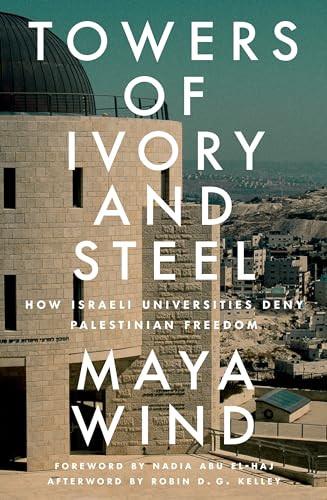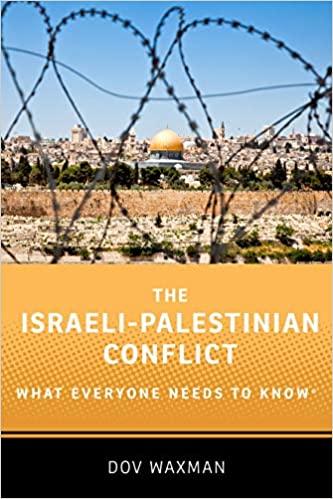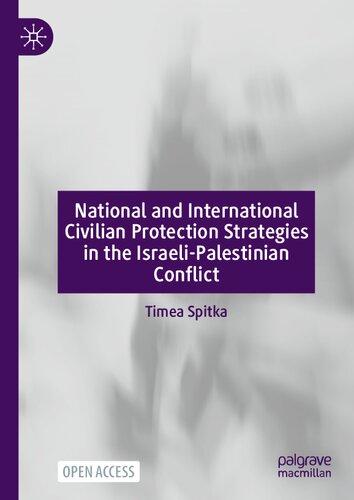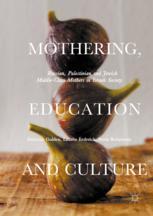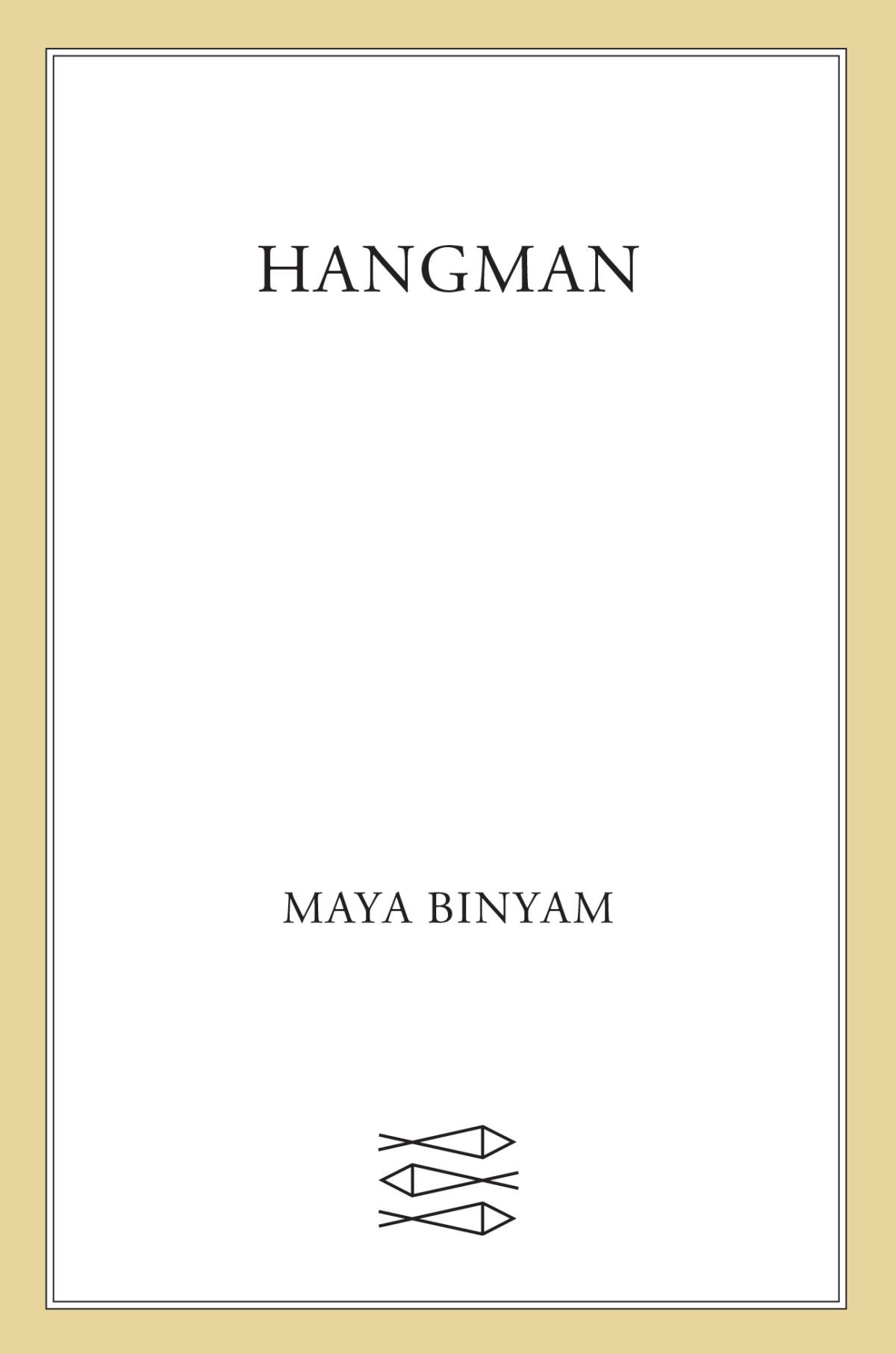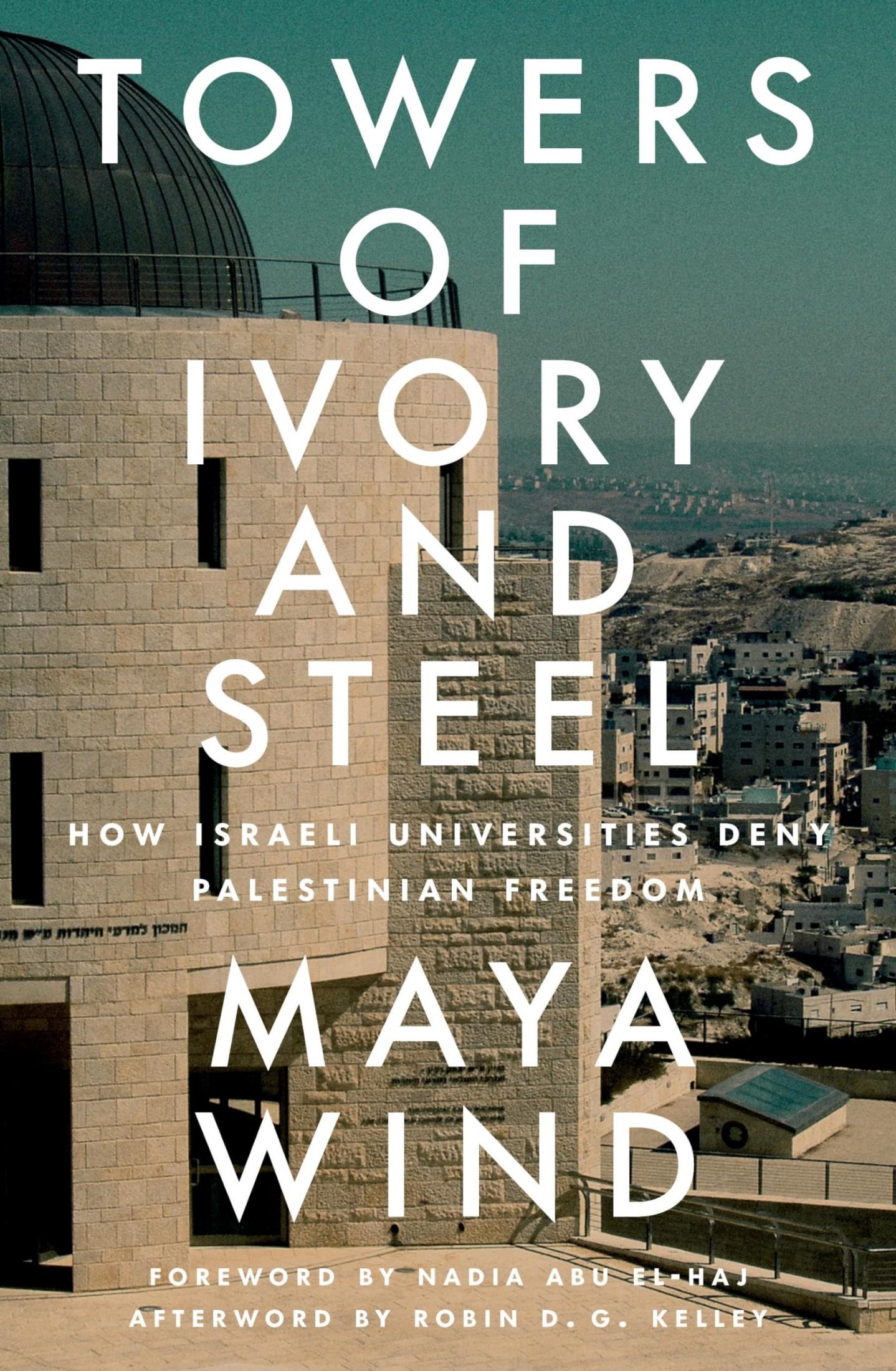Towers
of Ivory and Steel
How Israeli Universities Deny Palestinian Freedom
Maya Wind
First published by Verso 2024
© Maya Wind 2024
Foreword © Nadia Abu El-Haj
Afterword © Robin D. G. Kelley
All rights reserved
The moral rights of the author have been asserted
1 3 5 7 9 10 8 6 4 2
Verso
UK: 6 Meard Street, London W1F 0EG
US: 388 Atlantic Avenue, Brooklyn, NY 11217 versobooks.com
Verso is the imprint of New Left Books
ISBN-13: 978-1-80429-174-0
ISBN-13: 978-1-80429-176-4 (UK EBK)
ISBN-13: 978-1-80429-175-7 (US EBK)
British Library Cataloguing in Publication Data
A catalogue record for this book is available from the British Library
Library of Congress Cataloging-in-Publication Data
Names: Wind, Maya, author.
Title: Towers of ivory and steel : how Israeli universities deny Palestinian freedom / Maya Wind.
Description: London ; Brooklyn, N.Y. : Verso, 2024. | Includes bibliographical references and index.
Identifiers: LCCN 2023041708 (print) | LCCN 2023041709 (ebook) | ISBN 9781804291740 (trade paperback) | ISBN 9781804291757 (ebook)
Subjects: LCSH: Universities and colleges Political aspects Israel. | Education, Higher Political aspects Israel. | Higher education and state Israel. |
Palestinian Arabs Education (Higher)
Classification: LCC LA1443 .W56 2024 (print) | LCC LA1443 (ebook) | DDC 378.5694 dc23/eng/20230925
LC record available at https://lccn.loc.gov/2023041708
LC ebook record available at https://lccn.loc.gov/2023041709
Typeset in Minion by Hewer Text UK Ltd, Edinburgh Printed and bound by CPI Group (UK) Ltd, Croydon CR0 4YY
Contents
ForewordbyNadiaAbuEl-Haj
Introduction
Part I: COMPLICITY
1. Expertise of Subjugation
2. Outpost Campus
3. The Scholarly Security State
Part II: REPRESSION
4. Epistemic Occupation
5. Students Under Siege
6. Academia Against Liberation
Epilogue
AfterwordbyRobinD.G.Kelley
Acknowledgments
Notes
Index
Foreword
Nadia Abu El-Haj
July 24, 2023: The Israeli Knesset passes a bill that eliminates the “reasonableness standard,” that is, an Anglo legal concept that grants the High Court discretion to strike down government decisions and appointments it deems unreasonable. The first step in a broader judicial overhaul championed by the most right-wing ruling coalition in Israeli history, the entire opposition—fifty-six members of the Knesset—boycotted the vote. According to the NewYorkTimes, among many other English- and Hebrew-language publications, this bill and the larger judicial overhaul of which it is a part threatens to undermine “Israeli democracy.” Secular, liberal citizens who have overtaken the streets over the past several months are fighting, we are told, to save Israel’s soul.1
What if, however, this right-wing “turn” is better understood as the logical culmination of a state that, since its very establishment, has never been able to reconcile its “Jewish” and “democratic” commitments? A settler nation-state founded upon the expulsion of approximately 750,000 Palestinian inhabitants, Jewish democracy
was predicated on ethnic cleansing. That act was necessitated by the Zionist commitment to establishing a Jewish state: How else would one possibly establish a Jewish majority? What’s more, what if its non-Jewish—that is, its Palestinian—citizens, have never been and can never be equal members of a Jewish state? And what if, after over fifty years of ruling over Palestinian subjects—military rule and siege over the territories occupied in 1967—Israel’s very soul, its institutional and juridical core, is better described as foundationally antidemocratic?
As covered in the US press, the current Israeli political crisis is but one more instance of a more general shift toward right-wing, (proto-) fascist, and antidemocratic political movements throughout the Euro-American world. Writing from my home in New York, the slide into illiberalism and the threats to democratic institutions are on full display, here at home and not just elsewhere. And yet, I want to insist, what is unfolding in Israel should not be integrated, and certainly not seamlessly, into this larger global trend. Israel is not and has never been a democratic state.
Israel is not the state of its citizens. As a Jewish state, a fundamental distinction cleaves the contours of citizenship. While upon its establishment, the state declared it would protect the “religious” and “cultural” rights of its “minority” citizens, Israel was established as the “national home” of “the Jewish people,” wherever in the world they reside. Today, with approximately 20 percent of its citizenry Palestinian, with its military rule over nearly 5 million Palestinian subjects who enjoy none of the rights or protections of even an unequal citizenship—and with 68 percent of Palestinian refugees having no right of return—that foundational principle endures. In July 2018 the Israeli Knesset passed a new “Basic Law” that more than just perpetuates but absolutely enshrines Israel as “the Nation-State of the Jewish People.”2 Among other provisions, the law states that “the right to national self-determination” in Israel is “exclusive to the Jewish people”; what’s more, it declares, “the state views the development of Jewish settlement as a national value, and shall act to encourage and promote its establishment and
consolidation.”3 In response to legal challenges that argued the law is racist and antidemocratic, in 2021, the High Court—that very court purportedly essential to safeguarding Israel’s “democratic” character —ruled it constitutional, that is, one presumes, “reasonable.”
Israel should not be described as a democracy, “flawed as it may be,” now under threat from the right.4 Structural racism is not unique to the Israeli state, of course. But in comparison to those Euro-American liberal democracies with which Israel is generally compared, there is a cardinal, material difference: racial inequality is written into the law. More accurately, it is written into two separate legal regimes—one civil and one military—both of which differentially govern Palestinian and Jewish citizens and subjects who reside in territories under the state’s control. That is why in 2021 and 2022, Human Rights Watch, Amnesty International—as well as the Israeli human rights groups B’Tselem and Yesh Din—declared Israel an apartheid state.5
The vast majority of Jewish-Israelis protesting the judicial overhaul are worried, primarily, about threats to their own rights (and driven by an interest in the division of resources among the state’s Jewish citizenry)—that is, as secular liberals, as women, as LGBTQ+ persons. What is more, the protest leaders are doing their best to exclude any signs of Palestinian identity and politics from the demonstrations. Whatever the “soul” of Israel’s “liberal democracy” refers to, it does not include Palestinians—and the myriad political demands and imaginaries that comprise Palestinian politics.6 But what if we put the Question of Palestine at the center of what is at stake? What if realizing a democratic state is impossible without grappling with the fact that Israel is a settler nation still in the “frontier stage” of settlement? In a speech before the Knesset in advance of the vote on the reasonableness standard, the minister of justice—Yariv Levin—listed five government decisions the High Court had struck down using that standard: all of them “were about Palestinians and the occupation.” As Ben Reiff reports, this should come as no surprise. Levin has spoken previously about the need to “diminish the power of the judiciary” in order to realize the
annexation of the Occupied Territories. In short, as Reiff puts it, this is the “judicial overhaul’s endgame.”7 There is no “democratic Israel” that can be pried apart from the question of Palestine: this is a settler state. Its foundational commitments and acts—built into its enduring Zionist political imaginary and the operation of its institutions and political parties, liberal and illiberal alike—are racist and antidemocratic down to their very core. At least, that is, if one acknowledges that the lives of Palestinians, both citizens and subjects, and not just the state’s Jewish citizens, should be matters of political and ethical concern.
What then might any of this have to do with the topic of Maya Wind’s Towers of Ivory and Steel? Let me quote from her introduction: “For decades, Israeli universities have been widely celebrated in the West as exceptionally free. European and North American academic institutions maintain research collaborations and joint degree programs with Israeli universities, which are often the only such academic partnerships in the Middle East.” But what if they are not “exceptionally free”? What if Israeli universities, far from being bastions of pluralism, academic freedom, and spaces for open political dissent, are in fact “complicit in the violation of Palestinian rights?” Taking advantage of her position as a Jewish-Israeli citizen to gain access to Israeli universities, state and military archives, and libraries, Wind has collected, translated, and analyzed data essential to answering that question. An unparalleled and exceptional book that delves deeply into the history and modus operandi of some of Israel’s most vaunted liberal institutions, the result is an empirically robust case for the myriad ways in which such depictions are patently untrue. There is no “institutional innocence” here.
No university is an Ivory Tower—severed from the historical, political, and economic conditions of the state and society in which it exists. Nevertheless, working within what is now widely recognized as an apart-heid regime, the close ties between Israeli universities and the state—and the consequences of those ties—take, as Wind masterfully demonstrates, a distinctive form. Beginning in 1918 with the establishment of Hebrew University, the first of the now eight
major public institutions of higher learning, these universities have been an integral part of building and maintaining the state as the Jewish national home—including, quite centrally, through technologies and strategies of war, ethnic cleansing, occupation, and siege (see chapter 2). Not only have Palestinian students who are citizens of Israel been structurally marginalized and discriminated against, the universities often do the work of the state itself: they crack down on Palestinian student speech and organizations in the name of “security” (see chapter 5). What’s more, they house academic programs tailored to train soldiers and security forces. This is not the equivalent of military personnel enrolling for a university degree on an American university campus, nor, for that matter, is it equivalent to the presence of ROTC. This is more like having West Point embedded within a US university—an embedding, it is worth highlighting, that “requires” the university, among other things, to establish security zones within the dorms that house such personnel (chapters 1 and 3). For their part, Palestinian universities are subjected to both bureaucratic and military control: the Israeli state determines the number of foreign faculty and students allowed to teach and study at Palestinian universities, and vets them (on political grounds) before granting visas. Universities in Gaza, the strip itself under continuous siege, are cut off from the outside world almost entirely and exposed, over and over again, to aerial bombardment. For their part, Palestinian universities throughout the West Bank, including East Jerusalem, are repeatedly subjected to closures and raids, with their students and faculty arrested and, often, subjected to torture while in detention (chapter 6). Meanwhile, not only do the vast majority of Israeli academics remain silent, so too does the university leadership. There is absolutely no institutional defense of academic freedom when it comes to Palestinian universities. And in the midst of the escalating violence of what is closing in on a sixty-year “occupation,” not a single university has severed ties with Israeli military or security forces, let alone with Israel’s arms industry (chapters 3 and 6).
July 23, 2023: The American Anthropological Association announces passage of a resolution to boycott Israeli academic institutions by a 71 percent margin.
The law striking down the “reasonableness standard,” the AAA’s boycott vote: these two events happened on the same day. I juxtapose them here not because I harbor any illusions regarding their respective political impacts. I juxtapose them, rather, because of the nature of the discourse mobilized against heeding the call for a boycott of Israeli academic institutions, in the US and elsewhere— that is, the argument that Israel is a secular democratic state, far less oppressive than many other regimes worldwide. In short, Why “single out” Israel? Such political what-about-ism, as should be apparent to anyone paying attention, is but a tactic to derail Palestinian resistance to the Israeli state. No political project—not ever, not anywhere—has addressed every single possible cause at one and the same time. That is not the nature of politics. The substantive—the more sincere—question is: “Are Israeli universities complicit in the violation of Palestinian rights?” as Wind asks. This expansively researched, empirically detailed, carefully argued book provides a clear answer: “Yes.” As demonstrated by the American Anthropological Association’s recent vote, the international academic community is recognizing, increasingly, the deep entrenchment and complicity of Israeli universities with Israel’s ongoing and fundamentally antidemocratic project of settlement and apartheid. And it is coming to the conclusion that continuing to conduct business as usual with Israeli universities is, decidedly, “unreasonable.” To those—liberals and conservatives, on the left and on the right—who oppose the call for an academic boycott, I ask: Is there any Palestinian resistance movement that you might ever—or that you have ever—recognized as legitimate?
Introduction
On the gray afternoon of January 10, 2022, a windowless white van with a Palestinian license plate drove onto the campus of Birzeit University, north of Ramallah in the occupied West Bank. Once the van had cleared the east campus gate, two men in jeans and hooded sweatshirts emerged from the front doors. They began making their way to a meeting of the student council, where the elected heads of the various student blocs were in attendance. Then, suddenly, the back doors of the van swung open, and Israeli uniformed soldiers leapt out—some from the special forces in dark ski masks—armed with semiautomatic weapons. They quickly followed in the footsteps of the two undercover Israeli soldiers and opened gunfire.
Chaos broke out as the students tried to disperse, but the soldiers knew exactly who they were after. They slammed four student association leaders onto the ground. There they lay, face down, as they were handcuffed, blindfolded, and beaten. Other soldiers were directed to aim their rifles at the perimeter of the scene, as students tried to document what was unfolding on their campus in broad daylight.
One of the leading student organizers, Ismail Barghouthi, scrambled up the closed university gate to escape. But soldiers targeted him and shot him in the thigh. He was seized, along with four other students, and taken away in the white van, leaving behind a pool of blood on the asphalt beneath the campus east gate.1
The five students were brought to the Ofer military detention center in the occupied West Bank, where they were interrogated for hours by Israeli officers. Three students were released, but Barghouthi and his peer Mohammed Khatib remained in detention.2 Barghouthi and Khatib were indicted by the Israeli military court system for their activities in their respective student groups, which Israel termed “unauthorized associations.”3 While his case was processed, Barghouthi was detained for weeks. Meanwhile, Khatib was placed under administrative detention—by which Palestinians can be indefinitely incarcerated in Israeli military prisons without charge or trial—for months, until May 2022.4
Barghouthi and Khatib are among dozens of Palestinian university students abducted and detained by Israel every year in the Occupied Palestinian Territory (OPT), for membership or activities in 1 of the 411 student associations Israel has deemed “unlawful.”5 They were among the fifty-four Palestinian students incarcerated in 2022 alone.6
Just months after the raid on Birzeit University, on April 17, 2022, a demonstration was held near the Tel Aviv University campus, outside the offices of the Israeli Security Agency, the Shin Bet. Organized for Palestinian Prisoner’s Day, the protest was held in solidarity with Palestinian prisoners under administrative detention.
Rami Salman, a Palestinian Tel Aviv University student, made his way to the demonstration. A citizen of Israel, Salman wore a kaffiyeh and stood alongside dozens of Palestinian and Jewish-Israeli citizen activists calling for an end to the authoritarian practice of student detention in the OPT.7 After the protest, Salman headed back to his dorm, located opposite the Shin Bet offices.
He didn’t make it far. Salman was followed to the university by Israeli undercover police officers. He was seized on the stairs to his dorm building, beaten, and dragged to his arrest.8
Across all the territories under Israeli governance, the university campus is not a safe space for Palestinian students. Israeli universities are not independent of the Israeli security state but, rather, serve as an extension of its violence.
Salman’s own institution, Tel Aviv University, announced in July 2023 that it is embarking on yet another partnership with the Israeli military. The university had won the Ministry of Defense bid to house the prestigious “Erez” BA program for officers in combat military units. The dual-major degree includes an academic program focused on military “areas of interest,” paired with another program in the humanities, social sciences, business, or engineering.9 In the Erez program, the military explains, “military and academic training are intertwined,” wherein the cadets are transformed “from civilians to elite fighters.”10
Accompanying the prestige—and substantial state funding—is a fifty-three-page list of conditions from the Ministry of Defense agreement, which Tel Aviv University signed upon winning the bid. The soldiers will be in uniform and permitted to carry their military weapons to campus. They will study most courses alongside civilian students, except for their tailored nonacademic military courses— offered on campus and taught by senior military personnel—which also earn them credit toward their degree. For the academic courses offered by the university to soldiers and civilians alike, the Ministry of Defense suggested a list of topics that they consider “integral” to the Erez program. These include “strategy and national security,” “terror and guerrillas,” and “contemporary military thought.”11
Per the agreement with the state, the university commits to reporting to the military any and all “field security issues,” should it be required. And, crucially, faculty must now conduct themselves in accordance with military restrictions. The university, the agreement demands, “undertakes to ensure that the academic staff will refrain from offensive statements toward the IDF soldiers studying at the
institution, whether it is statements concerning their actual military service in the IDF or whether it is statements concerning them wearing uniforms. This commitment is essential.”12
Not only, then, will Tel Aviv University take on the additional qualities of a military base, it will now become further embedded in the state apparatuses that sustain the occupation. Armed with military training and a Tel Aviv University degree, combat officers will go on to maintain Israeli military rule and a system of racial oppression over millions of Palestinians, including university students —like Barghouthi, Khatib, and Salman.
For decades, Israeli universities have been widely celebrated in the West as exceptionally free. European and North American academic institutions maintain research collaborations and joint degree programs with Israeli universities, which are often the only such academic partnerships in the Middle East. Upon launching a dual degree program with Tel Aviv University in 2020—the only such program it offers in the region—Columbia University advertised its Israeli counterpart as one that “shares Tel Aviv’s unshakable spirit of openness and innovation—and boasts a campus life as dynamic and pluralistic as the metropolis itself.”13 Speaking at an advocacy summit to grow support for Israel among American college students, Columbia University president and First Amendment scholar Lee Bollinger declared:
We are committed to cooperating with partners in Israel, to learn from them and to foster global conversations, through which students and universities can help to shape all societies. Experiencing different perspectives, of course, deepens our understanding of different narratives, and also we understand how countries manage everything from pluralism and conflict to illness and drought—all universal issues.14
Columbia is not alone in characterizing Israeli universities as liberal bastions of pluralism and democracy, uniquely worthy of academic partnerships in the broader landscape of the Middle East.15 In 2022, the US-based Freedom House scored Israeli academic freedom as 3 out of 4, contending that “Israel’s universities have
long been centers for dissent and are open to all students.”16 That same year, the European-based Varieties of Democracy Institute ranked Israel as among the top 10 percent of countries in the world for academic freedom.17 These assessments mirror Israeli academia’s self-narration, as one of “unwavering and unparalleled commitment to excellence, multiculturalism, pluralism, and the cause of peace.”18
This apparent Western consensus has, however, been questioned by Palestinians. In 2004, academics and intellectuals launched the Palestinian Campaign for the Academic and Cultural Boycott of Israel (PACBI) and called on international scholars to initiate a boycott of Israeli academic institutions. They explained their call to target Israeli universities on the grounds of decades of ongoing institutional complicity in Israel’s “regime of oppression” against Palestinians. Israeli institutions of higher education, PACBI contends, “have played a key role in planning, implementing and justifying Israel’s occupation and apartheid policies.”19 For PACBI, the academic boycott is not merely a means to an end but rather a strategic targeting of the Israeli academy as “one of the pillars of this oppressive order.”20
Shortly thereafter, in 2005, 170 Palestinian civil society groups— including trade unions, refugee rights associations, women’s organizations, grassroots popular committees, and NGO networks— came together to launch the Boycott, Divestment, and Sanctions (BDS) movement. Inspired by the South African movement against apartheid, Palestinians call for BDS as a means to exert pressure on Israel to meet the three core demands of Palestinian civil society, as stipulated in international law and UN resolutions: first, end the colonization of Arab lands and dismantle the military occupation and the wall; second, recognize the right to full equality of Palestinian citizens of Israel; and third, respect and promote the right of Palestinian refugees to return.21
Many in the international community have responded to this call. In North America, some academic associations have adopted BDS resolutions over the last decade, including the American
Anthropological Association, the American Studies Association, the Middle East Studies Association, and the Native American and Indigenous Studies Association. So, too, have faculty and graduate student unions, including UAW Local 2865, the University of California student worker union; UAW Local 2110, New York University’s graduate student organizing committee; and the University of Toronto Graduate Students’ Union.22 In Europe, the Teachers’ Union of Ireland, the British Society for Middle Eastern Studies, and the UK National Union of Students, among others, have voted to endorse the boycott.23 Sustained by broad coalitions and endorsed in votes on thoroughly debated resolutions, the academic boycott is gaining traction worldwide.
The backlash to this growing movement has been severe. The Israeli government and international Zionist organizations have used lawsuits, lobbying, legislation, and what activists and civil rights organizations call “intimidation and smear campaigns” to intercept, demonize, or even criminalize the movement wherever it gains momentum.24 The debate over the academic boycott has roiled universities across Europe, North America, Australia, and South Africa and has become central to discussions about race, justice, and the meaning of academic freedom in higher education.
With rare exceptions, Israeli academics have responded to PACBI’s campaign with overwhelming and often indignant opposition. From across the Israeli political spectrum, faculty have formed well-coordinated counter-campaigns to any initiative to support the boycott, often backed by funding and talking points provided by the Israeli state itself.25
These Israeli scholars—representing Israeli state arguments in international academia’s court of public opinion—have by and large converged on a similar refrain: Injustices committed against Palestinians may or may not exist; but even if they did, this has nothing to do with us. Writing in opposition to the first referendum on the academic boycott by the American Anthropological Association in 2015, leading Israeli anthropologist Dan Rabinowitz published his outward-facing apologia for Israeli higher education in
the English edition of Ha’aretz. “Israel does inflict injustices on Palestinians,” he wrote, “but making universities accountable for them is ludicrous.”26
This claim by Israeli scholars that they are but bystanders has become central to their opposition strategy, especially with rising worldwide support for the academic boycott. Anticipating the passage of the resolution to endorse the boycott by the Middle East Studies Association of North America (MESA) in 2022, Israeli academics built their case on both institutional and individual innocence. The Middle East and Islamic Studies Association of Israel asserted that the group is “apolitical” and that Israeli universities are, likewise, not responsible for government policy. Meanwhile, the Association for Israel Studies implored MESA not to “punish” Israeli academics for mere “guilt by association.”27
Having declared that their universities and academic associations play no part in Israel’s oppression of Palestinians—“even if” such oppression existed—Israeli academics have swiftly moved to claim that, in fact, they are the ones being repressed. Israeli academics thereby subvert the argument for Palestinian rights—and, specifically, the academic rights of Palestinian scholars and students —for their own ends. At risk of violation, they argue, are the academic freedom and rights of individual Israeli scholars, wrongfully held accountable for injustices for which they bear no responsibility. This claim misrepresents PACBI’s call to boycott Israeli academic institutions and not individual scholars. Yet the absolute majority of Israeli academics continue to rally against what they insist is directed at them on a personal basis.28
As the debates about the academic boycott have expanded in the Western academic arena, certain Israeli scholars have emerged as particularly effective gatekeepers of the conversation. Curiously, these scholars are often “self-styled progressives” who argue—for an international audience—that they support Palestinian rights yet oppose the academic boycott. In fact, self-identified progressive Israeli scholars and associations frequently hinge their opposition based on this very identification.29 “Most of the humanistic and
dissident voices in Israel,” argued anthropologist Baruch Kimmerling, “sound from the ranks of the academy, or are supported by its faculty members.”30 While admitting that not all members of the Israeli academy can be counted among supporters of Palestinian rights, Kimmerling nevertheless insisted that the international academic community refrain from enacting the boycott, so as to safeguard Israeli universities as a platform for progressive mobilization.31 Most recently, in 2023, the Israeli Anthropological Association came out in opposition to the second referendum on the academic boycott at the American Anthropological Association, claiming it would be counterproductive to boycott Israeli universities that are, in fact, “at the forefront of the struggle to maintain democracy and equal rights.”32
Liberal Israeli scholars, then, join with their right-wing compatriots in their opposition to the academic boycott, arguing that Israeli universities and their faculty are being mistakenly and therefore unjustly—targeted. They do so based on the foundational claim that Israeli universities must be institutionally distinguished from the Israeli state. For too long, the Western academic community has taken these claims at face value.
This book therefore begins with the question posed by Palestinian civil society, and which Israeli academia has endeavored to foreclose: Are Israeli universities complicit in the violation of Palestinian rights?
The book seeks to answer this question by revealing how Israeli universities are entangled with Israeli systems of oppression. It does so by drawing on the extensive research conducted by Palestinian scholars and civil society organizations, as well as by making the evaluation of the data about the complicity of Israeli universities— which has been kept principally as an internal Jewish-Israeli conversation—subject to international debate.33
My position as a white, Jewish-Israeli citizen awarded me ready access to Israeli state and military archives and libraries, where I read official policy documents, state and military memos, government-sponsored research reports, newspapers, books from
Israeli academic presses, and unpublished master’s and doctoral theses approved by the Israeli universities themselves. This vast trove of papers demonstrates, in great detail, Israeli universities’ many ties to the Israeli state, including to its apparatuses of violence. It offers abundant data about the theories, expertise, infrastructure, and technologies developed in and through Israeli universities to support Israeli territorial, demographic, and military projects. Yet, such archives exist almost exclusively in Hebrew and remain mostly inaccessible to audiences outside of Israel. This book, then, translates, synthesizes, and critically analyzes this data and existing research to make it more widely accessible to the international academic community.
My status enabled me to enter Israeli universities and observe conferences and events across campuses. There I could witness the terms under which the discourse on Palestine and Palestinians develops and unfolds, and how Palestinian and critical Jewish-Israeli students and faculty navigate university life and politics. I conducted interviews with Palestinian students and Palestinian and JewishIsraeli faculty, many of whom were willing to share their experiences and analyses. Yet they consistently asked to have their names withheld for fear of retaliation both within and outside their universities. Honoring this request, I omit identifying information and use pseudonyms whenever quoting or directly drawing on interviews. In the process of research and writing, I also engaged the analyses of Palestinian student organizers, many of whom advocate for transparency about their universities to help build the international pressure that they believe—in contrast with the JewishIsraeli “self-styled progressives” gatekeeping their opinions from international discourse—is required for these institutions to be decolonized and remade.
This book also draws on critical Palestinian and Jewish-Israeli academic scholarship on the Israeli system of higher education. Palestinian scholars have been interrogating Israeli universities for decades. They have studied and analyzed the limits imposed on Palestinian knowledge production, pedagogy, and expression on
Israeli campuses, as well as Israeli violations of the right to education of millions of Palestinians living under military occupation.34 This analysis has been built upon by several JewishIsraeli scholars, who have critically examined the universities designed for their own benefit, as well as the mechanisms by which both Palestinian and Jewish anticolonial thought was excluded from academic spaces.35 This book, a comprehensive study of the Israeli university, builds on this rich body of work to demonstrate the complicity of Israeli institutions of higher education in Israel’s projects of settler colonialism and apartheid.
On Apartheid and the Academic Boycott
After decades of sustained research and advocacy by Palestinian scholars, activists, and human rights and civil society organizations, there is growing worldwide recognition of the Israeli regime of apartheid imposed over the Palestinian people.36 In 2021, Human Rights Watch issued a detailed report concluding that the actions of the Israeli state—the systemic oppression of Palestinians across Israel and in the OPT, the inhumane acts committed against them, and the intent to maintain this domination—together constitute the crimes against humanity of apartheid and persecution.37 This was followed in 2022 by an Amnesty International report, which likewise determined that Israel operates a system of apartheid against the entire Palestinian people, including refugees, and called for pressure by the international community to dismantle it.38 Even major Israeli human rights organizations B’Tselem and Yesh Din issued reports recognizing, albeit within their own conceptual limitations, Israel’s regime of apartheid.39
Leading Palestinian human rights organization Al-Haq has documented an increase in discussions of Israeli apartheid in the United Nations Human Right Council (UNHRC), and growing official recognition of Israeli apartheid by state governments, such as South
Africa and Namibia.40 Notably, the UNHRC Commission of Inquiry’s first report on Israeli discrimination against Palestinian citizens of Israel, Palestinians in the OPT, and Palestinian refugees and exiles abroad, also cited the 1973 International Convention on the Suppression and Punishment of the Crime of Apartheid.41
On the heels of this emerging consensus, there is growing recognition in the international community of how Israeli practices are rooted in settler colonialism. This is evident in the 2022 report of Michael Lynk, former UN special rapporteur of human rights in the Palestinian Territory occupied since 1967. In his report, Lynk determined that Israel’s political system in the OPT qualifies as apartheid, which, he acknowledged, directly resulted from Israel’s settler-colonial project in the West Bank, including East Jerusalem.42 The current UN special rapporteur, Francesca Albanese, similarly noted that Israel’s practice of intentionally seizing Palestinian land and seeking to replace indigenous Palestinians with Jewish-Israelis in the OPT is not only a war crime under the Rome Statute, but a “hallmark of settler colonialism.”43 Albanese concluded that the comprehensive view of Israeli practices of apartheid required recognition of its settler-colonial “root causes.”44 Building on years of research and advocacy by Palestinian scholars, legal experts, and civil society organizations, Al-Haq in 2022 detailed in a comprehensive report how Israeli military occupation and apartheid are tools of Israel’s decades-long project of settler colonialism. Palestinian civil society coalitions argue that Israeli apartheid cannot be fully dismantled without recognition of Israeli settler colonialism, which they regard to be as old as the Israeli state, and are calling for the academic boycott as an essential step toward decolonization.45
In January 2023, the Palestine Liberation Organization (PLO) joined the BDS Movement, the Palestinian NGO Network, the Palestinian Ministry of Justice, and the Palestinian Human Rights Organizations Council to issue a historic anti-apartheid statement and call to action. Collectively, they called for building a global front to end Israeli settler colonialism, apartheid, and occupation and advocated for Palestinian rights as stipulated in international law and
UN resolutions.46 This broad Palestinian coalition explained apartheid as both a tool and manifestation of Israeli settler colonialism, which must be dismantled so that Palestinians can exercise their inalienable rights, as stipulated in international law. They called on the international community to participate in the BDS movement, including the sanctioning of complicit Israeli academic institutions.47 Palestinian civil society has thus drawn for Israeli universities a clear road map to decolonization. They have called on the international community to guide its implementation by at the very least “ending complicity” in the system of oppression.
Yet despite repeated calls by Palestinians to hold accountable the very institutions implicated in Israeli violations of international law, even the growing global recognition of Israeli settler colonialism and apartheid often overlooks Israeli universities. This book intends to contribute to international conversations about holding Israeli universities accountable, by documenting the material ways in which they are implicated in the systemic violation of Palestinian rights and academic freedom. Israeli universities have often been exceptionalized by scholars in the Western-dominated academic community and have been shielded from many of the criticisms directed at peer institutions in other settler states. Yet it is precisely in this that Israeli universities stand apart. As academic institutions directly and actively implicated in what has overwhelmingly been recognized as a regime of apartheid, Israeli universities are continually exempted, or “singled out,” from the Palestinian demands for justice.
This exemption is all the more striking considering the degree to which Israeli universities are embedded in the Israeli state’s systems of oppression and racial domination against Palestinians. Tel Aviv University’s Erez program and institutional ties to the Israeli security state are by no means exceptional. There are eight major public Israeli universities. They are all directly governed by the Israeli Council for Higher Education and largely funded by its Planning and Budgeting Committee.48 As this book will show, all eight universities operate in direct service of the state and serve critical functions in
sustaining its policies, and thereby constitute central pillars of Israeli settler colonialism.
The Settler University
Settler-colonial states are founded through foreign invasion, with the objective of eliminating Native inhabitants and establishing a settler nation on Native land. Settlers seek to replace the Natives and claim the territory as their own.49 Settler colonialism is therefore understood as a distinct form of colonial governance, because it centers domination over land, which, in effect, becomes domination over life. To maintain their settler state and make the place their home, settlers must continually reassert their exclusive claim to the land, making the violent campaign to disappear the land’s Indigenous peoples into an ongoing process of invasion and dispossession rather than a single or historical event.50 As Audra Simpson illuminates, this settling of land and of consciousness continually builds “moral and political worlds,” as well as physical ones, “atop the worlds of others.”51
The logic of elimination and replacement that typifies settlercolonial states is constitutive of the Zionist movement and the Israeli state.52 The stated mission of the Zionist movement was to settle in historic Palestine and establish a Jewish majority as the basis for a Jewish state. From the dawn of the movement and for decades afterward, Zionist leaders, organizations, and institutions openly called their project the “colonization” of Palestine.53 For Zionist leaders and later for the Israeli government, this has entailed pursuing a deliberate strategy of Jewish migration and settlement, with the aim of expelling the indigenous Palestinians and altering the land’s racial composition. The planned and incremental dispossession of Palestinians by the Zionist movement over half a century was consolidated and accelerated with the 1948 mass expulsion during the establishment of Israel, what Palestinians call the Nakba
(catastrophe).54 With Israel’s founding, the state continued this territorial and demographic program of replacement, officially terming it “Judaization.”55 In the decades since, Israel has worked to maintain a demographic superiority and population distribution, so as to undermine Palestinian claims to their lands and to selfdetermination.56
From the start, Israeli academia has been entangled in this territorial project of replacement central to Israeli state building. Indeed, before even the founding of Israel, the Zionist movement founded three universities, which were explicitly to serve the movement’s territorial objectives in Palestine. First, in 1918, Hebrew University was established as a comprehensive university and center for the formation of a new collective Jewish-Zionist identity and nation. Founded at the apex of Mt. Scopus, it was also built as a strategic outpost for the Zionist movement to stake symbolic and political claim to Jerusalem.57 Likewise, the Technion in Haifa and the Weizmann Institute in Rehovot were established to advance the scientific and technological development of Israel as a Jewish state in historic Palestine.58
In the lead-up to the 1948 war, these three institutions of higher education were directly recruited to support the violent dispossession required for Zionist territorial expansion. The leading Zionist militia, the Haganah, established a Science Corps, which opened bases on all three campuses to research and refine military capabilities. Throughout the 1948 war, the universities helped sustain the Haganah and other militias in their mass expulsion of Palestinians to establish the state of Israel.59 Faculty and students developed and manufactured weapons, as their campuses, equipment, and expertise were put to the service of Zionist militias. With the establishment of Israel, the Technion and the Weizmann Institute came to anchor the state’s scientific-military capabilities (chapter 3).60
Over the state’s first two decades, prominent academics further aligned with political leaders, and the government consolidated its
